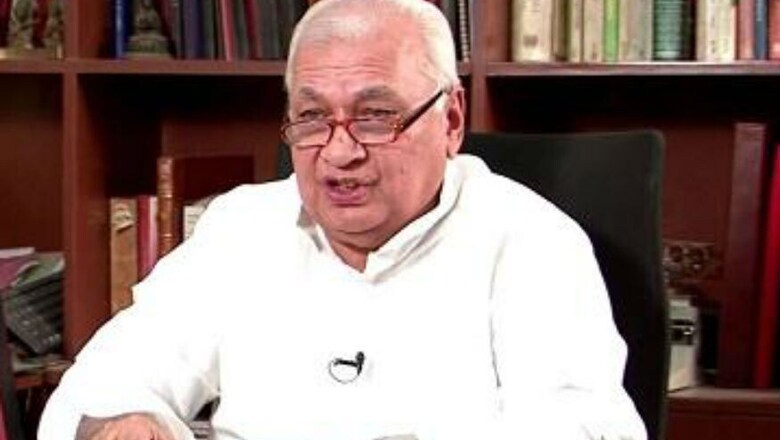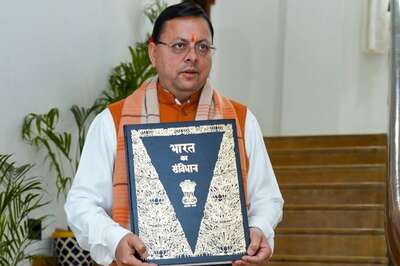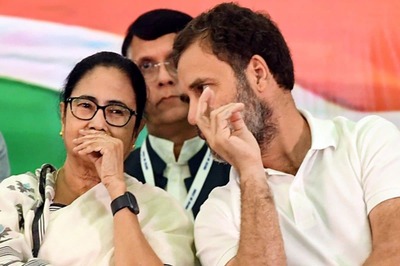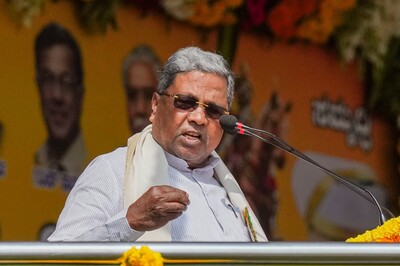
views
On 23 August 1985, Arif Mohammad Khan, minister of state for home affairs in Rajiv Gandhi government, delivered a passionate speech in the Lok Sabha defending the Supreme Court judgment in the Shah Bano case.
It was in the backdrop of a private member bill that was moved in the Lok Sabha by an MP named GM Banatwala, seeking to exempt Muslims from the purview of Section 125, an exemption that was nullified by the apex court judgement.
A few minutes after the bill was introduced, Khan wrote his resignation,and told an interviewer, afterwards, that with this new legislation "Indian Muslim women will be the only women to be denied maintenance anywhere in the world".
As the issue of 'triple talaq' and the desirability of uniform civil code (UCC) is once again being debated, Firstpost spoke to Khan to understand what has changed in last three decades and whether he feels that this time around, Muslim women will get their due and their right to equality.
When asked about his expectations from the judiciary and government Khan said, the question is what the citizens and in this case, women of India should expect from the government and judiciary. Naturally, the expectation will be that they uphold the law of land and ensure the basic constitutional guarantee of equality before law and equal protection of the laws which includes equality in marital rights.
Reacting to government's notion of triple talaq being a violation to the right to equality of women, as well as their dignity, Khan said that 'triple divorce' does not negate equality and dignity of Muslim women as human beings and citizens of India. In fact the Personal Law Board publication titled The Compendium of Islamic Laws itself describes this form of divorce as "talaq bidat", where bidat means innovation, or something that is not part of the original scheme.
The Islamic laws describe it as "good in law and bad in religion” and it is indeed bad because it seeks to dehumanise women. The important question is how you can defend something in the name of religion that you admit to be bad in religion.
He further said that it is an attempt to perpetuate something that is repulsive both to religion and good conscience.
"It is important to note that few years after the death of the Prophet, when triple divorce found legal sanction, the men who resorted to triple divorce were awarded 40 lashes as punishment as they were perceived to have committed a crime. Today you cannot resort to lashing, so a new law may be enacted providing for four years of rigorous imprisonment for the crime of triple talaq."
Khan also said that securing a UCC for the citizens throughout the territory of India, is a constitutional principle, not enforceable by the courts but fundamental in the governance of the country. If the state is serious about carrying out this obligation, then we can always endeavour to find common ground. To my mind the basic thing to be ensured is that the law should not have any provision that prescribes a thing that is prohibited by any religion. But this debate can start only when we have in hand some proposed draft.
Having explained what motivates the Personal Law Board, Khan said that the problem is not the Personal Law Board, but the lackadaisical attitude of political establishment.
"It is not the Muslims who have chosen the Board as their representative organisation. It is the political establishment that gave them credibility and legitimacy.
The board has moved in a calculated manner and now has started claiming the status of "the sole spokesman” as Muslim League had done in 1930s. I feel that the political establishment must engage every organisation to enlist their cooperation for the solution of a problem, but it must be wary of any organisation that claims to be the sole spokesman of a religious community.", Khan said.
It was this 'sole spokesman' business that divided India in 1947 and today, this can divide India from within, he reiterated.




















Comments
0 comment